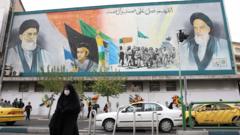Iran's supreme leader, Ayatollah Ali Khamenei, is at a crossroads, deciding whether to retaliate with force against Israel's escalating military actions or to maintain a stance of restraint that could be perceived as weakness. Israel has taken significant military action following the deadly Hamas attacks on October 7, which have heightened tensions in the region and left Iran's leadership grappling with a series of challenging decisions. With each strike, both nations are caught in a cycle of threats and counterthreats that could spiral out of control.
Iran's Dilemma: Balancing Escalation and Perceived Weakness in Strained Tensions with Israel

Iran's Dilemma: Balancing Escalation and Perceived Weakness in Strained Tensions with Israel
As Israel intensifies military actions against Iran, Tehran faces the precarious choice of escalation versus the perception of vulnerability in a complex geopolitical dance.
In the wake of an Israeli airstrike that killed a senior Iranian commander, Tehran has vowed to respond, stating that any aggression will be met with retaliation. Nevertheless, diplomatic voices, including British Prime Minister Sir Keir Starmer, urge restraint to avoid escalating violence further. While Iran flexes its military rhetoric, it also acknowledges the risks of war—simpatico with its leadership’s aspirations to maintain its standing in the region. The stakes are especially high as Israel continues to leverage U.S. support, raising fears of an even more extensive conflict.
Consequently, Iran has started employing a strategy of proxy warfare, relying on allied groups such as Hezbollah and the Houthis to apply pressure on Israel, rather than initiating direct confrontation. However, the situation has left Iran's allies in Lebanon vulnerable to major Israeli offensives, leading to significant territorial losses and casualties. As the consequences of these actions unfold, Iran must navigate the tightrope of demonstrating resilience while avoiding a full-scale military confrontation that would threaten its regime.
With the looming U.S. elections and President Biden’s backing of Israel's military response, the world watches closely, hoping diplomacy can prevail. The potential for a renewed dialogue over Iran's nuclear program could be a pathway to de-escalation, but the specter of internal and external pressures complicates decision-making in Tehran.
As the region stands on the brink of wider conflict, Iran's ultimate choice may dictate not only its future but also the fragile peace of the Middle East.
Consequently, Iran has started employing a strategy of proxy warfare, relying on allied groups such as Hezbollah and the Houthis to apply pressure on Israel, rather than initiating direct confrontation. However, the situation has left Iran's allies in Lebanon vulnerable to major Israeli offensives, leading to significant territorial losses and casualties. As the consequences of these actions unfold, Iran must navigate the tightrope of demonstrating resilience while avoiding a full-scale military confrontation that would threaten its regime.
With the looming U.S. elections and President Biden’s backing of Israel's military response, the world watches closely, hoping diplomacy can prevail. The potential for a renewed dialogue over Iran's nuclear program could be a pathway to de-escalation, but the specter of internal and external pressures complicates decision-making in Tehran.
As the region stands on the brink of wider conflict, Iran's ultimate choice may dictate not only its future but also the fragile peace of the Middle East.






















